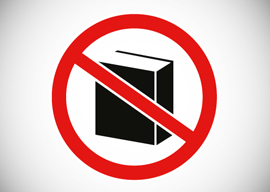
October 10, 2014

Source: Shutterstock
Wyman grew up around these people, and during her childhood they kept many “non-negotiable forms of social and economic justice” from her. She doesn”t explain what this means, but it’s obviously very, very bad, and the brouhaha over the books shows that they are continuing this tradition of being very bad people who hate social justice. That these people only want a set of mediocre books removed from a school curriculum and not banned from bookstores or school property is unimportant. This is censorship and it is a major threat to free thought.
Wyman’s article is a perfect representation of what Banned Book Week is in reality: leftists scouring the country to find examples of people trying to take books with liberal messages off of reading lists and then pretending this is the greatest current threat to the First Amendment. They then spin a tale in which these “censors” are much more powerful than they are in reality, and the opposition to them consists of brave freedom fighters. In Wyman’s case, her childhood was made difficult by these dark forces, and now they are trying to ruin the childhoods of a new generation.
When people like Wyman see a world where their social and political ideals aren”t universally embraced, they suffer and lash out at those who stand in the way. In this case, parents who don”t want to subsidize literature they object to are the enemy. Since the left needs their enemies to be all-powerful to make their David and Goliath narrative work, this group of people is presented as part of a larger group of homogenous haters of freedom that can only be stopped from ruining things through constant vigilance and self-righteous blog posts.”¨”¨Perhaps the most demoralizing part of all of this is seeing what kinds of books have pushed actual literature off of school reading lists. Do young Americans still read Fitzgerald? Or what about Solzhenitsyn? He endured and then wrote about war, Stalin’s death camps, actual censorship, and exile. That he suffered more, and complained less, than our compulsively unhappy social justice warriors speaks volumes about the quality of the latter.”¨”¨